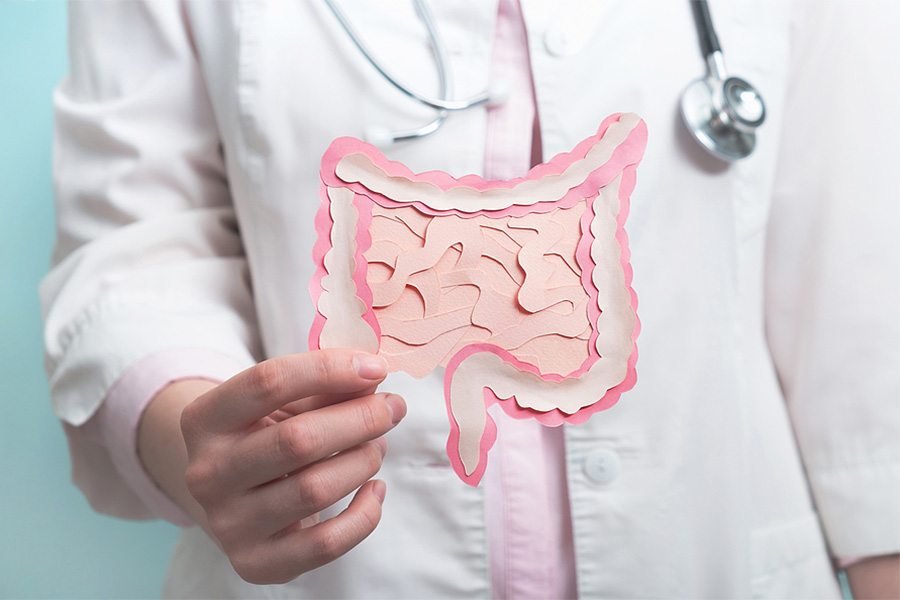Occasional digestive symptoms can be both painful and annoying, but when things like bloating, gas, diarrhea or constipation, or heartburn are a constant presence in your life, they can really limit where you go and what you do. Many of my patients make the needed dietary and lifestyle changes and find they continue to have digestive symptoms that simply do not go away.
Our bodies are fascinating and complex, and understanding the digestive system is important to obtaining optimal health. We know that your bodies need food to provide it with energy, vitamins, and minerals. But did you also know that in order to use food, we must first break it down into substances that the various organs and cells in our body can use? This is the job of our digestive system.
If you experience digestive issues, like many do, it is important to get to the root cause of why these problems are occurring. It could be something that is short lived and your digestive system is quickly restored to health, but sometimes something deeper is going on, such as a bacterial or parasitical infection.
Below is a list of tests that you might encounter when you have digestive problems.
Comprehensive Digestive Stool Analysis (CDSA)
Comprehensive digestive stool analysis (CDSA) tests for digestive system function, absorption, gut flora, and the colonic environment. This test is needed for evaluation of chronic gastrointestinal (GI) issues, such as indigestion, dysbiosis, constipation, bloating, gas and diarrhea, to name a few. In addition, it can be recommended for serious bowel changes and systemic diseases. CDSA evaluates digestion of food particles, absorption of nutrients, the presence of bacterial or yeast infection, floral imbalance, intestinal immune function, and dietary fiber intake adequacy. A stool sample is generally gathered at home and sent for analysis.
Testing for food allergies and food intolerances
If you think you might have an intolerance or sensitivity to food, I suggest that you omit foods such as gluten, eggs, corn, peanuts and dairy. These are the groups that usually cause allergic responses. However, there are many foods and food additives, in addition to environmental factors (within your body and externally), that can cause digestive symptoms.
Not only should you stay away from foods that irritate you and cause symptoms, but at the same time I suggest that you take supplements to heal your gut integrity. This should work with most food sensitivities within 4–6 months, and you might be able to once again enjoy a food that used to bother you. Sometimes the sensitivity does not go away or it could be a “true” allergy that lasts for your entire life (called “IgE” allergies).
If you’ve tried following healthy nutritional guidelines, but you still have symptoms, you might want to consider testing for food intolerance or sensitivity. The following tests are used in functional medicine to identify food intolerances and sensitivities (IgG).
- IgG RAST to specific foods, such as milk, egg, corn, peanuts or wheat
- Celiac panel and genetic tests (HLA DQ2, DQ8)
- Organic acids (gut flora by-products, specifically)
- Breath testing for lactose and fructose
- Intestinal permeability testing (lactulose-mannitol)
- Stool analysis (absorption, digestion, inflammatory markers, microecology)
- Food sensitivity testing will determine if you are sensitive to various foods and additives and possibly allergic.
Gluten sensitivity and Celiac Disease
Gluten sensitivity, once rare, is more frequently identified today. Up to 30 percent of the population carries a genetic predisposition to gluten sensitivity and celiac. This causes an inflammatory/autoimmune response in your gut when you are exposed to gluten.
Try to eliminate gluten to help reestablish optimal digestive system function. You might be able to eventually reintroduce gluten-containing foods with minimal ill effect. There are others, however, who find they are healthier by remaining gluten-free, after they’ve healed their digestive problems. Women who have celiac disease, the most severe form of gluten sensitivity, and are exposed to tiny amounts of gluten have a response that damages the small intestine, impairs nutrient absorption, and leads to additional complications.
If you have been gluten free to heal your digestive system, try to reintroduce a small amount of gluten. If this causes your symptoms to return, you are probably gluten-intolerant or gluten-sensitive. You might consider genetic testing (genotyping) or autoantibody screening (serotyping), if you have a genetic susceptibility to celiac.
Laboratory and diagnostic testing for celiac disease
- Three-month trial of gluten elimination
- Celiac panel
- Anti-deaminated gliadin IgG and IgA
- Anti-gliadin IgG and IgA
- IgA anti-endomysium antibody
- IgA and IgG anti-transglutaminase ELISA (tTG)
- Total IgA (IgA deficiencies ten times more common in CD)
- HLA DQ2, DQ8 typing
- Intestinal biopsy
Parasite and pathogens testing
Many pathogens and parasites can upset your healthy digestive system and cause symptoms in the gut. There are some signs that indicate their presence, but the best way to find out for sure is to undergo testing.
If you can choose to have specialists evaluate your stool samples, that would be ideal. The greater the specialist’s experience with pathogenic organisms, the better equipped the pathologist will be to perform a thorough analysis that identifies any problematic organisms.
There are many labs in the United States and Mexico that screen for yeast overgrowth and the presence of ova (eggs) and parasites. The labs also test overall digestive function, including absorption and immune status.
Below is a list of some of the important pathogenic organisms that affect digestion.
Helicobacter pylori. This bacterial infection can cause bloating, belching, nausea, and pain in the stomach. Infection can lead to stomach ulcers and inflammation and an increased risk of stomach cancer. Your healthcare practitioner can request a test to find out if you have an H. pylori infection. This infection is treated with antibiotics and drugs that reduce acid.
Fungal dysbiosis/candidiasis. Molds and yeasts can stay in the body and grow under the “right” conditions. A well-known example is yeast, candida albicans, normally found in the digestive tract. Yeast grows when there is a digestive imbalance. Signs include oral thrush, vaginal yeast infections, diarrhea, constipation, flatulence, and irritable bowel disease. Candidiasis can be diagnosed with a stool test. Treatment is with an antifungal enzyme supplement (such as Candex or oil of oregano), following a yeast-free diet, and taking a probiotic to reintroduce floral balance.
Small-bowel bacterial overgrowth (SBBO). If you have symptoms of indigestion, especially gas and bloating, with diarrhea, irregularity and abdominal pain, this can signal bacterial overgrowth in your small intestine. Like candidiasis, this overgrowth is common, but it is the underlying conditions that favor those organisms, which allows the overgrowth to happen. This must be examined to be sure that the problem does not reoccur. The presence of SBBO can be verified using breath testing. SIBO (what is this? didn’t see it mentioned before) is harder to diagnose but when treated can make a huge overall difference.
Parasites. Your GI tract has many good microbes, but harmful ones exist as well and can be the culprit to many symptoms. “Don’t drink the water” is good travel advice, but there are other ways to get a parasite infection, such as from infected pets, farms, contaminated foods or surfaces, even walking barefoot on contaminated soil can infect you with a parasite.
Intestinal parasites usually cause diarrhea and abdominal pain, with flatulence, cramps, blood or mucus in the stools. They also cause other symptoms (seemingly unrelated), such as fatigue, fevers, chills. There have also been symptoms like rashes, hives, arthritis, and foggy thinking.
When you talk with your healthcare provider, ask for a panel of tests to determine the specific organisms that are causing the infection, and then you can be treated just for that. Some of the more common organisms that cause trouble include giardia, klebsiella, cryptosporidia, blastocystis hominis, entamœba histolytica, and helminths (flatworms and roundworms). Sending a stool sample to a laboratory that specializes in ova and parasites (O&P) will return more accurate results than using a general lab. At the clinic we often use Genova Diagnostics Comprehensive Parasitilogy CP x 2 test for our diagnostics.
Digestive biochemical deficiencies testing
Your digestive system has an extraordinary way of using the nutrients that you provide your body. Good digestion needs biochemicals to breakdown, assimilate, and eliminate nutrients. These include digestive enzymes, regulatory digestive hormones, stomach acid, and bile acids. Women can be deficient because of long-term digestive imbalance or other genetic factors. The CDSA panel (described previously) includes an evaluation of enzyme and acid sufficiency.
Enzyme deficiencies are treated depending on the enzyme levels. Certain foods and herbs increase enzyme creation, while in other cases supplemental enzymes might be needed.
If you have low stomach acid (hypochlorhydria), your stomach doesn’t produce enough hydrochloric acid – needed to breakdown proteins in your food and assimilate them in your intestines. The acid also fends off pathogens that you ingest. Unfortunately, the symptoms of low stomach acid and excess stomach acid are similar. Many women use acid suppressants, such as TUMS, before the real problem is discovered. This deficiency can often be corrected by using betaine-HCl supplements. It is available over-the-counter, but betaine-HCl should only be taken with the guidance of a functional medical practitioner. If you use it improperly, it can cause harm.
This article has reviewed just a few of the indicators of GI tract dysfunction and disease progression. Other digestive system concerns that can be tested include sufficiency of bile acid production, markers of malabsorption and dysbiosis (such as organic acids), markers of oxidative gut stress, and sensitive markers of bowel inflammation (such as calprotectin and lactoferrin). Careful analysis will help determine and treat the cause of digestive illness. Many systemic issues are helped by understanding that the gut health and ill health can affect the entire body.







